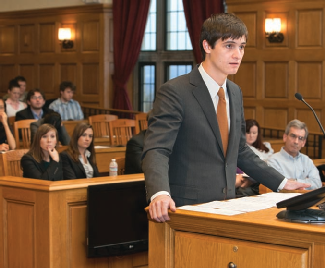Theater Department Told to Cut Budget; Five Students Die Since December; Speaker Pelosi Tapped for Senior Convocation; New Students To Read Blade Runner Book; Medical Research Building Moves Forward; Tuition Approaches $40K in Endowed Colleges; Multimedia Tribute to Mike Abrams; As Economy Flounders, Law School Applications Surge; A Starry Outlook for Arecibo?; Glee Club Sells Out Kennedy Center; Admissions' Davis to Depart


In January, the University hosted a celebration to mark the opening of its highly efficient Combined Heat and Power Plant. Part of Cornell's plan to have net zero greenhouse gas emissions by 2050, the $80 million, 15,000-square-foot facility is located adjacent to the existing coal-fired heating plant on Dryden Road. Its two giant turbines are fired by natural gas to generate electricity; waste heat from that process is used to make steam—which in turn is piped through campus for heating. The system is expected to cut Cornell's carbon dioxide emissions by some 75,000 tons a year and eliminate its use of coal, also saving the 100,000 gallons of diesel fuel needed to deliver the coal from West Virginia. Said President David Skorton at the grand opening: "Through example and the bully pulpit, we will educate the state, the nation, and the world."
Theater Department Told to Cut Budget
The financial picture has taken a dramatic turn for the Department of Theatre, Film, and Dance. The administration of the College of Arts and Sciences has directed the department to cut its non-professorial budget by $1 million to $2 million a year within two years. Department leaders, faculty, and staff are working to formulate cost-cutting proposals, though specifics have not yet been announced; their plan will then be submitted to Arts and Sciences Dean Peter Lepage for approval. "I have encouraged the department to be creative, especially as they think of the student experience in theater, dance, and film," says Lepage. "It is possible that in the future, students will gain even more direct experience on stage and in other aspects of production." No changes will be made to the current season's performance schedule.
Five Students Die Since December
The University is mourning the loss of five students who passed away since the end of fall semester. In late December Adam Frey, a varsity wrestler from Shaler Township, Pennsylvania, died at a Pittsburgh hospital, two years after being diagnosed with cancer. He was twenty-three; originally a member of the Class of 2009, he had taken time off due to his illness. On New Year's Day, twenty-year-old Clayton DeFisher '11—a biology major in CALS, a Cornell Presidential Research Scholar, and an instructor for Cornell Outdoor Education—suffered cardiac arrest in his hometown of Williamson, New York. In mid-January, environmental science major Oliver Schaufelberger '11, twenty, died of undisclosed causes at home in Lebanon, New Jersey. Two weeks later, twenty-year-old Mark von Bucher '12, an animal science major from Rochester, New York, died from head injuries sustained in a skiing accident in Utah over winter break. And in mid-February, eighteen-year-old Bradley Ginsburg '13 of Boca Raton, Florida, was found dead in Fall Creek Gorge after being reported missing by his roommate. Ginsburg was an economics major in Arts and Sciences.
Speaker Pelosi Tapped for Senior Convocation
 Nancy Pelosi, Speaker of the U.S. House of Representatives, will give the address at Senior Convocation during Commencement Weekend. The event, which is open to the public, will be held in Schoellkopf Stadium. (In case of inclement weather, tickets will be required for an indoor ceremony.) A Democratic member of Congress since 1987, Pelosi is the first woman to serve as Speaker.
Nancy Pelosi, Speaker of the U.S. House of Representatives, will give the address at Senior Convocation during Commencement Weekend. The event, which is open to the public, will be held in Schoellkopf Stadium. (In case of inclement weather, tickets will be required for an indoor ceremony.) A Democratic member of Congress since 1987, Pelosi is the first woman to serve as Speaker.
New Students To Read Blade Runner Book
 The acclaimed 1968 science fiction novel that inspired the film Blade Runner will be the focus of this year's New Student Reading Project. Philip K. Dick's Do Androids Dream of Electric Sheep? takes place in a dystopian future where a lonely private eye hunts down bioengineered robots who seek to outlive their programmed lifespans. It will be read by freshmen and transfer students, with faculty leading discussions in August. Communication professor Jeff Hancock, who will speak at one of five campus forums, notes that although Dick's vision of humanlike androids has not yet come to pass, it has been realized to some extent in the form of online avatars in virtual worlds like Second Life. "The future in a way is here, and we need to be thinking about our behaviors in digital spaces," he says. "It has a lot of implications for ethics and for student behavior—and the idea that whatever you do online leaves traces."
The acclaimed 1968 science fiction novel that inspired the film Blade Runner will be the focus of this year's New Student Reading Project. Philip K. Dick's Do Androids Dream of Electric Sheep? takes place in a dystopian future where a lonely private eye hunts down bioengineered robots who seek to outlive their programmed lifespans. It will be read by freshmen and transfer students, with faculty leading discussions in August. Communication professor Jeff Hancock, who will speak at one of five campus forums, notes that although Dick's vision of humanlike androids has not yet come to pass, it has been realized to some extent in the form of online avatars in virtual worlds like Second Life. "The future in a way is here, and we need to be thinking about our behaviors in digital spaces," he says. "It has a lot of implications for ethics and for student behavior—and the idea that whatever you do online leaves traces."
To participate in the project, go to http://reading.cornell.edu.
Medical Research Building Moves Forward

The Board of Trustees has voted to approve construction of Weill Cornell's new $650 million Medical Research Building. To be located on East 69th Street between First and York avenues, the 476,000-square-foot facility will be the "epicenter of experimental research" at the Medical College, says associate provost and executive vice dean Stephen Cohen. It will have thirteen floors of laboratories as well as teaching space and conference facilities. Excavation and foundation work began last July, with a target completion date of July 2013.
Tuition Approaches $40K in Endowed Colleges
Undergraduate tuition in the endowed colleges will rise 4.5 percent for 2010-11, to $39,450. With room, board, and mandatory fees, the cost will total $52,316. In-state tuition in the statutory colleges will rise the same dollar amount—$1,700—which constitutes a 7.9 percent hike, to $23,310. For out-of-staters, statutory tuition will be the same as endowed. Graduate school tuition will not increase, though tuition in the professional schools (law, business, and veterinary medicine) will go up 4.5 percent.
Multimedia Tribute to Mike Abrams
 In 1945, M. H. "Mike" Abrams came to Cornell to teach English—and he's been here ever since. Over the course of his remarkable career, the Class of 1916 Professor of English Emeritus has taught students including Harold Bloom '51 and Thomas Pynchon '59, written acclaimed critical studies, lectured on the importance of reading poetry aloud, served as the general editor for seven editions of the Norton Anthology of English Literature—and gone to every home football game. Those accomplishments, and many more, are chronicled in the latest offering from the Internet-First University Press, M. H. Abrams at Cornell. This multimedia work collects articles written by and about Abrams, as well as lectures, a bibliography, a photo gallery, and other resources. Taken together, they offer a rich portrait of a great scholar and teacher who has been hailed as "an iconic name in literary studies" by Professor Jeffrey Williams of Carnegie Mellon University.
In 1945, M. H. "Mike" Abrams came to Cornell to teach English—and he's been here ever since. Over the course of his remarkable career, the Class of 1916 Professor of English Emeritus has taught students including Harold Bloom '51 and Thomas Pynchon '59, written acclaimed critical studies, lectured on the importance of reading poetry aloud, served as the general editor for seven editions of the Norton Anthology of English Literature—and gone to every home football game. Those accomplishments, and many more, are chronicled in the latest offering from the Internet-First University Press, M. H. Abrams at Cornell. This multimedia work collects articles written by and about Abrams, as well as lectures, a bibliography, a photo gallery, and other resources. Taken together, they offer a rich portrait of a great scholar and teacher who has been hailed as "an iconic name in literary studies" by Professor Jeffrey Williams of Carnegie Mellon University.
M. H. Abrams at Cornell is available online at http://ecommons.library.cornell.edu/ handle/1813/14294 and can be purchased as a book and two-disc DVD from the Cornell Store at http://site.booksite.com/3635/nl/?list=CNL5.
As Economy Flounders, Law School Applications Surge

The Law School has seen a dramatic jump in applications: 52.5 percent over the previous year. More than 6,000 aspiring lawyers sought admission for 2010-11, a school record. According to school officials, some increase was expected—since applications are up 5 percent nationwide and the number of LSAT test-takers has risen 20 percent, as people seek alternatives in a difficult job market—but the huge hike was unexpected. Possible reasons include Cornell's small-town location, which makes it more affordable than urban schools. "I'd like to think a big part of the explanation is that the word's getting out," says Dean Stewart Schwab. "Cornell is a great place to study law."
A Starry Outlook for Arecibo?

As Cornell's Arecibo Observatory continues to struggle for survival, a final report to Congress has offered some good news: the facility's radar system was found to play a unique role in identifying near-Earth objects (NEOs). The National Research Council's report, which examined NASA's progress in meeting Congressional mandates to search for NEOs that might threaten the planet, said that immediate action is necessary to keep Arecibo operating. The observatory's fate has been uncertain since 2006, when an NSF advisory panel recommended its budget be slashed, which could force its closure. Says astronomy professor Don Campbell, PhD '71: "We hope that NASA and the NSF take seriously the committee's strong recommendation that the Arecibo program be supported."
Glee Club Sells Out Kennedy Center
The Glee Club's January tour of the Northeast featured sold-out concerts at such venerable venues as the Kennedy Center in Washington, D.C., and Lincoln Center's Alice Tully Hall. The tour also included a public concert at the Newseum in Washington, a performance for the Supreme Court (at the invitation of Justice Ruth Bader Ginsburg '54), and a show at Boston's historic Old South Church, as well as school workshops and alumni receptions. When the group returned to campus, it held a benefit concert in Sage Chapel to raise funds for a Cornell-affiliated medical clinic that has been aiding thousands of injured and displaced victims of the Haiti earthquake.
Admissions' Davis to Depart
 Cornell's chief admissions officer is leaving. Associate provost for admissions and enrollment Doris Davis will open her own educational consulting business— though not until the Class of 2014 has been finalized. During Davis's tenure, the student body became more ethnically diverse, applications rose, Cornell increased financial aid for less affluent families, and the acceptance rate fell to an all-time low of 19.1 percent. The University received more than 36,000 applications for the Class of 2014—a 5 percent increase over the previous year—including nearly 3,600 seeking early admission.
Cornell's chief admissions officer is leaving. Associate provost for admissions and enrollment Doris Davis will open her own educational consulting business— though not until the Class of 2014 has been finalized. During Davis's tenure, the student body became more ethnically diverse, applications rose, Cornell increased financial aid for less affluent families, and the acceptance rate fell to an all-time low of 19.1 percent. The University received more than 36,000 applications for the Class of 2014—a 5 percent increase over the previous year—including nearly 3,600 seeking early admission.


